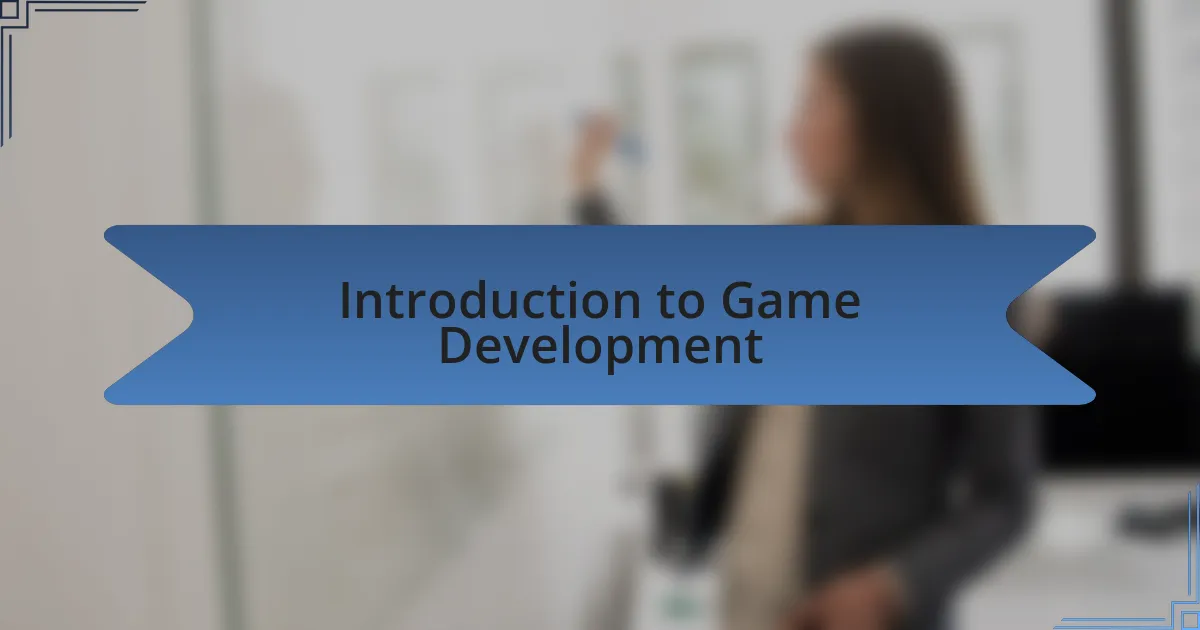Key takeaways:
- C# is integral to Unity development, enabling interactive storytelling and enhancing gameplay mechanics through object-oriented programming and event-driven architecture.
- Patience and attention to detail are crucial, as small oversights can lead to significant setbacks in coding and game mechanics.
- Collaboration and community support enhance problem-solving, offering valuable perspectives that can illuminate challenges.
- Embracing iteration and frequent testing transforms the development process, allowing for quicker identification of issues and a better final product.

Understanding C# in Unity
C# is at the heart of Unity development, and for me, grasping its nuances was both a challenge and a joy. I vividly recall the first time I wrote a simple script to control a character’s movement. The satisfaction of seeing that character react to my code sparked a deeper curiosity about how C# interacts with Unity’s vast features.
As I delved into C#, I discovered the importance of object-oriented programming. This wasn’t just about syntax; it was like learning a new language to communicate more effectively with the Unity engine. I often found myself pondering, “How does this help me create better gameplay?” The answer unfolded each time I crafted a script that enhanced player experience or introduced complex game mechanics.
One aspect that continually amazed me was Unity’s event-driven architecture. Understanding how to utilize events and delegates transformed my approach to coding. I remember launching a mini-game where players completed tasks based on real-time events, which made me think: “Could I make this even more interactive?” Exploring C# to address that question opened doors to concepts like asynchronous programming, letting me optimize gameplay and engage players in ways I had never imagined.

Basics of Software Development
Software development, at its core, is about solving problems and bringing ideas to life. When I first started coding, the sheer variety of languages and frameworks felt overwhelming. However, I quickly learned that understanding the fundamentals, such as algorithms and data structures, is essential for effective problem-solving. Every time I tackled a bug or optimized a feature, it was a reminder of how foundational concepts can lead to innovative solutions.
I remember working on a project where I needed to implement a scoring system. I had a basic idea, but I realized that if I didn’t take the time to structure my code properly, it would be chaotic. This moment highlighted the importance of best practices. Implementing principles like code readability and modular design not only made my work easier but also fostered collaboration when others joined the project. Have you ever faced a situation where messy code caused confusion? I certainly have, and it taught me to prioritize clarity in every line I write.
Collaboration is another vital aspect of software development that often gets overlooked. In one of my earlier projects, I teamed up with a designer who had great ideas but limited coding experience. By sharing knowledge and iterating together, we created a user interface that not only looked fantastic but also functioned seamlessly. It made me realize that the best applications often come from a blend of diverse skill sets and perspectives. Isn’t it fascinating how collaboration can elevate a project to new heights?

Introduction to Game Development
Game development is a thrilling and intricate journey that combines creativity with technical skill. I remember the first time I created a simple 2D game; the excitement of watching my character move across the screen was unparalleled. It made me realize that game development is not just about coding; it’s about crafting an experience that captivates players. How often do we play a game and get lost in its world? That sense of immersion stems from a developer’s ability to weave together storytelling, art, and mechanics.
As I delved deeper into the field, I encountered the complexities of different game engines and languages. Unity, for example, offers an accessible entry point for many aspiring game developers, with its user-friendly interface and extensive resources. I often reflect on how switching from basic programming to integrating C# with Unity felt like unlocking a new dimension of creativity. Have you ever found a tool that completely changed how you approach a project? For me, mastering Unity was a game-changer—literally and figuratively—because it opened up endless possibilities for what I could create.
In my experience, the thrill of game development often comes from iterative design and playtesting. Each time I released a version of my game, eagerly awaiting feedback, it was both nerve-wracking and exhilarating. Those moments when players engaged with my work and shared their experiences reminded me of the powerful connection that games can foster. Isn’t it fascinating how a well-crafted game can evoke emotions and draw us together in shared enjoyment? Through this ongoing process of creation and feedback, I discovered that every project is a new adventure, filled with learning and growth.

Importance of C# in Unity
C# is at the heart of Unity’s functionality, acting as the primary scripting language that brings game mechanics to life. I vividly remember when I first wrote a script to control the movement of my character. The moment I saw my code translate into tangible actions on the screen was electrifying. It cemented my understanding that C# is not just code; it’s the pulse of my game, enabling interactive storytelling and intricate gameplay mechanics.
What fascinates me about C# in Unity is its versatility and power. While working on a project, I found myself implementing complex algorithms for enemy AI behavior. Each time I debugged a piece of code, the satisfaction of finally getting everything to work seamlessly was immensely rewarding. Does it surprise you how much emotional connection coding can create with your project? I often felt like I was nurturing an idea, watching it evolve from a mere concept to a fully functional game.
Additionally, C# contributes to Unity’s efficiency through its robust architecture, allowing for organized and maintainable code. I’ve had my share of messy scripts, but learning to utilize object-oriented programming principles made a world of difference. Have you ever had moments when your code clicked perfectly? That clarity not only enhanced my coding skills but also improved my overall workflow, making my development process smoother and more enjoyable.

My Initial Challenges with C#
When I first dove into using C#, I was overwhelmed by the syntax and structure. I remember staring blankly at my screen, feeling like a deer in headlights. It was tough to translate my ideas into code. Have you ever faced that jarring moment of realizing your mental concept just doesn’t match what you’re typing? I sure did, and it made me question my coding abilities more than once.
As I started to grasp the basics, I hit a wall with understanding data types and how they interact. I clearly recall spending an entire evening trying to figure out why my player wouldn’t jump properly; it turned out I was mixing up integers and floats. Moments like these taught me the importance of precision in programming. Have you had similar experiences where a small mistake led to hours of troubleshooting?
Debugging was another hurdle I encountered early on. I often found myself lost in a sea of error messages that seemed cryptic. I remember my frustration when I’d fix one error only to uncover another. Each solved issue felt like a small victory, though, reminding me that perseverance pays off. Doesn’t it feel great when you finally conquer a daunting problem? These challenges forced me to develop resilience, and I found that each setback ultimately improved my coding skills.

Key Lessons from My Experience
Mastering C# while integrating it with Unity taught me the that patience is crucial. I vividly recall a moment when I spent hours setting up a game mechanic, only to realize I had overlooked a simple setting in the Unity inspector. It felt like a punch to the gut, but it forced me to slow down and pay closer attention to the details. Have you ever rushed through something only to regret it later? I learned that taking my time often leads to greater clarity and fewer headaches down the line.
I also discovered the significance of community. Early on, I was hesitant to seek help, thinking I should figure it all out myself. But after sharing my struggles in an online forum, I received an outpouring of support and insight from seasoned developers. This taught me that collaboration fosters growth. Isn’t it amazing how a different perspective can illuminate a problem you thought was insurmountable? Now, I actively engage with other developers, sharing knowledge and experiences.
Lastly, I realized the power of iteration. Each game I worked on started as a rough sketch; countless prototypes were tossed aside before landing on something worthwhile. I remember launching a prototype of a game mechanic that I was convinced would be a hit, only for it to flop miserably during playtesting. The experience was humbling but invaluable. It reminded me that failure is just a stepping stone to success – each iteration brought me closer to my goals. How many times have you had to pivot your approach to achieve the desired outcome? Embracing this iterative process has not just improved my coding but has also taught me to welcome change as part of the creative journey.

Tips for Successful Integration
When I think about successful integration of C with Unity, documentation stands out as a vital tool. I remember diving into a complex function and getting lost without clear instructions. That was a turning point for me! Keeping well-organized notes and a reference guide not only saved me time but also boosted my confidence. Have you ever found clarity through documentation? I believe that having a detailed reference helps streamline the process, making troubleshooting feel less daunting.
One of the most surprising tips I learned along the way is the benefit of testing frequently. Initially, I would work on a game feature for days before running tests, only to uncover a slew of unexpected bugs. It was frustrating! Now, I incorporate unit tests early in my development cycle. This shift not only saves me hours of headache later but allows me to catch issues while they are still small. Do you take a similar approach with your projects? I encourage you to try it—early testing can transform your workflow.
Lastly, I gained immense insight from version control systems. Early in my journey, I neglected using a version control tool, which resulted in losing hours of work due to a simple mistake. The panic from that experience still lingers in my mind. Integrating a version control system like Git has since been invaluable. Now, I can experiment freely and revert changes if needed, making my development process much more flexible and less stressful. Isn’t it reassuring to know that you have a safety net? Understanding the power of version control is a game-changer for anyone looking to integrate effectively.